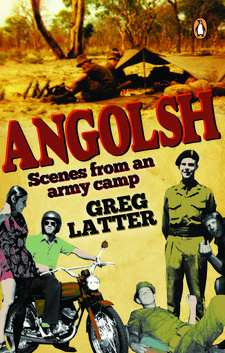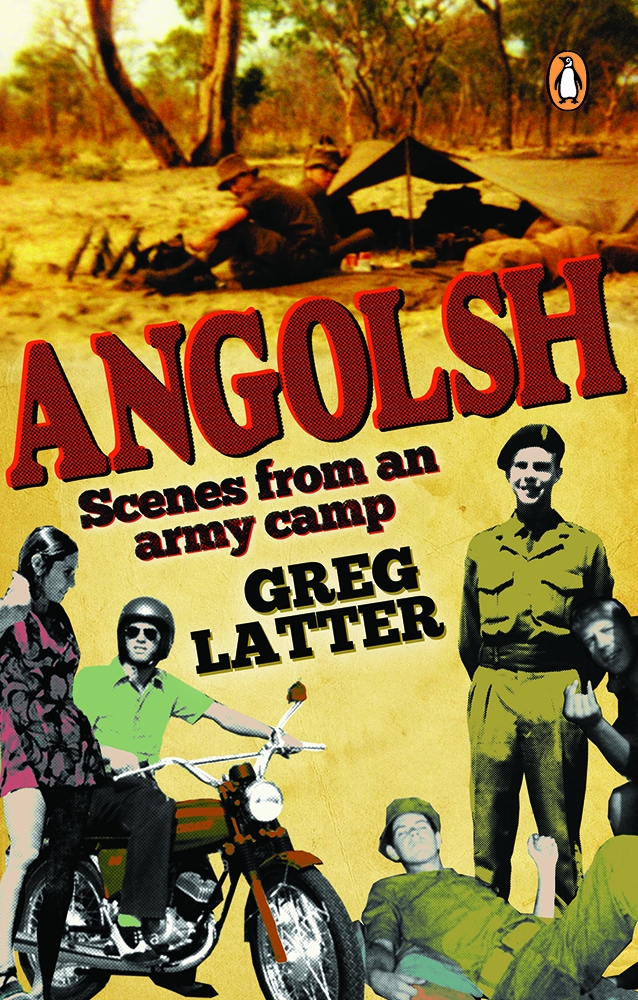Angolsh. Scenes from an army camp, by Greg Latter

Angolsh. Scenes from an army camp, by Greg Latter. Penguin Random House South Africa. Imprint: Penguin Books. Cape Town, South Africa 2019. ISBN 9781776094851 ISBN 978-1-77-609485-1
Angolsh. Scenes from an army camp, by Greg Latter. The telegram came out of the blue, simply stating that I was to present myself at such-and-such a place at such-and-such a time for a three-month army camp attached to the Transvaal Horse Artillery.
Boy, I was chuffed. I mean, I knew we were at war, that the Cubans were in Angola and there was big shit happening, what with the communists trying to take over almost the entire continent of Africa. It was 1976 and we'd just got TV in South Africa so the eight o'clock news was hot entertainment we sucked in big time. All that crap about God on our side and whatnot we took for granted. At least I did. I was twenty years old, naive and patriotic, the perfect candidate for a bush war. Bring on the Cubans. And bring on the sunshine. Cos back then I was working underground. Not underground like a terrorist. No, this was real underground. Four kilometres down East Shaft at ERPM in Boksburg, a blaster working the stope on 62 Level with a team of thirty men under me, imported contract workers from Malawi and Mozambique, mostly older than me and more experienced in that field, if you can call it a field, but because they were black they couldn't get a blasting ticket like me and earn the big bucks. It's how it was. White bums in the butter. And not for a moment in those days did I ever think it was odd or wrong, unfair or unnatural. It was what it was. Its very dark underground. Black. In fact it's more black than black. If you re alone in a tunnel and you switch off your lamp you get very scared. Even your balance goes haywire. And the silence is too awful. So you quickly switch your lamp back on, praying to God it still has enough juice to get you to the shaft and out. But this is not a story about the mines. Suffice to say, the idea of getting out of that dark hole into the bright sunshine for a few months seemed like a wonderful idea to me at the time. Straight off I went to my mine captain and showed him the telegram and he gave me a week's paid leave, suggesting I go off and enjoy myself before the shit hit the fan. I asked what shit and he clocked me a longish look that clearly suggested I was off the mark. That's when the first doubts crept into my mind. What if it wasn't going to be fun? Come to think of it, the army had never been fun. I had hated almost every minute of the ten months' compulsory national service I did at 4th Field Regiment in Potchefstroom back in '73. The instructors were sadistic Afrikaners who hated English-speaking South Africans and made our lives a misery. If you were Jewish it was even worse. I've always liked Jews. I went to a school where there were Jews, almost all cleverer than us WASPs, plus they threw nice parties where their mothers cooked amazing food. For me, the army was the first time in my life I ever came across blatant racism. You know, in-your-face stuff. Jou fokken Jode was a common phrase the instructors used, especially on Friday evenings when assembling them to go to the local synagogue in town. Then the resentment really went up a notch. But to give you an idea of how far this racism went I need to relate a little story about a fellow called Cohen. [...]
This is an excerpt from Angolsh. Scenes from an army camp, by Greg Latter.
Title: Angolsh
Subtitle: : Scenes from an army camp
Author: Greg Latter
Publisher: Penguin Random House South Africa
Imprint: Penguin Books
Cape Town, South Africa 2019
ISBN 9781776094851 ISBN 978-1-77-609485-1
Softcover, 13 x 21 cm, 170 pages
Latter, Greg im Namibiana-Buchangebot
Angolsh. Scenes from an army camp
Written with humour and humanity, Angolsh: Scenes from an army camp, evokes the atmosphere of South Africa's 1970s.

